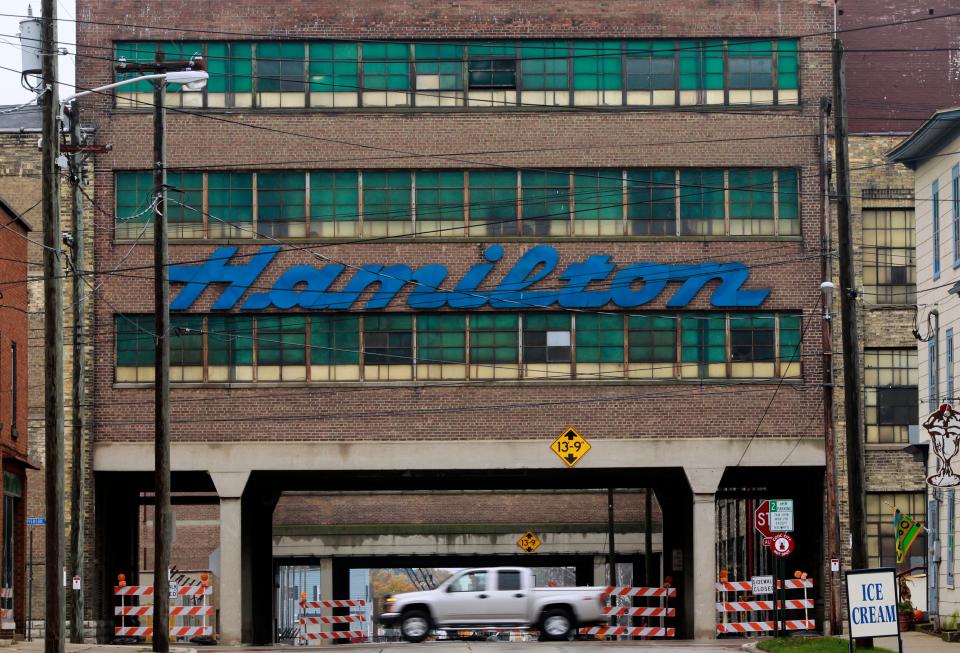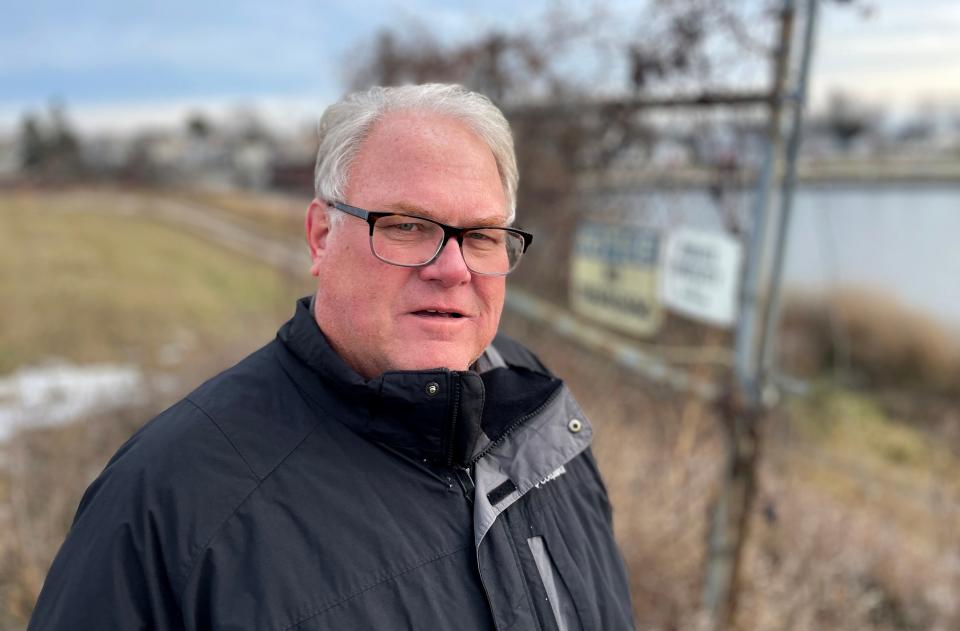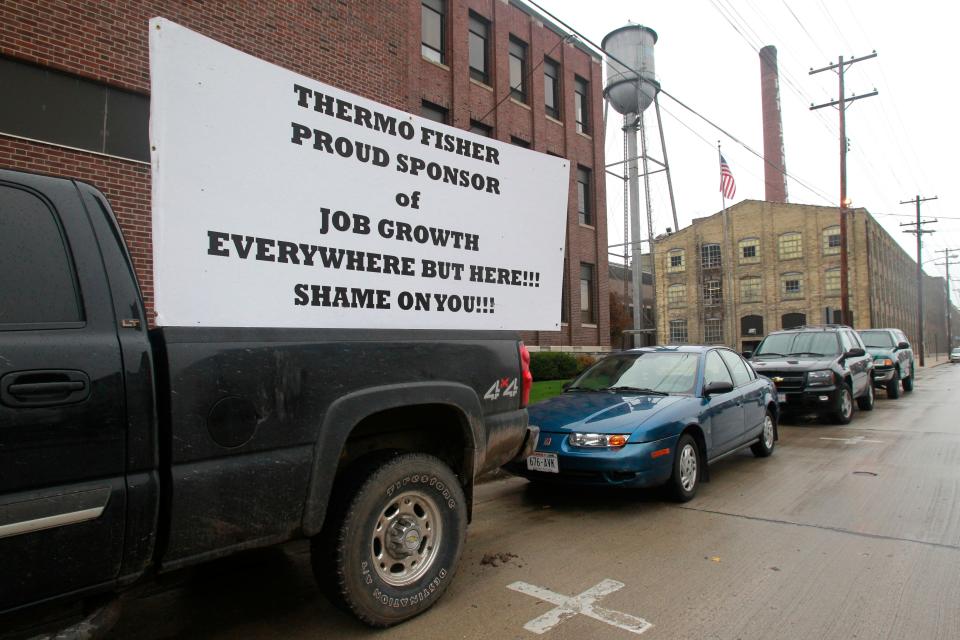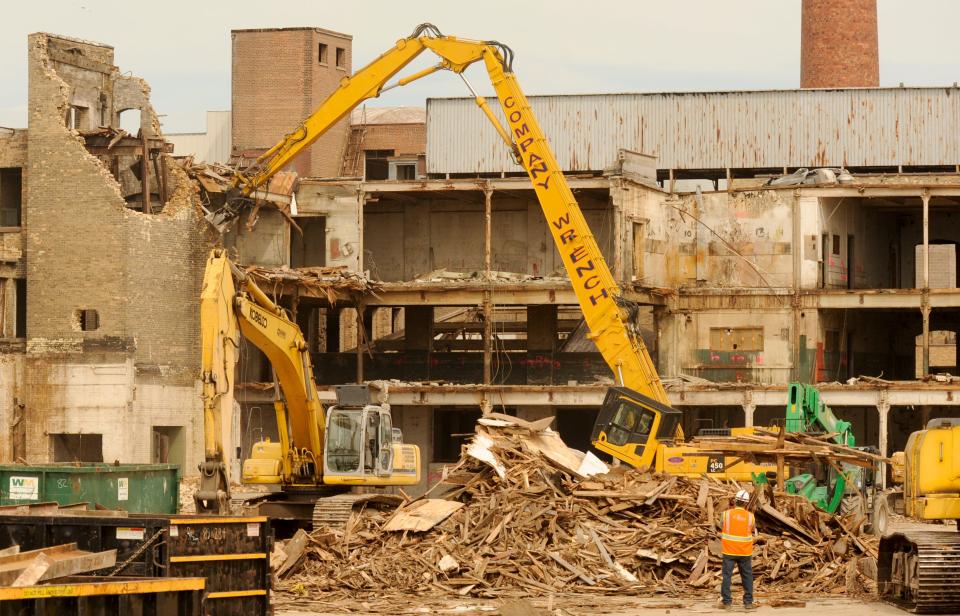TWO RIVERS, Wisconsin — Nearly all that’s left of a century-old company in this city just north of Manitowoc is a museum and a vacant lot looking onto Lake Michigan. But not long ago, its departure upended hundreds of lives and foreshadowed allegations of a violent drug cartel infiltrating a factory in Mexico.
It was 11 days before Christmas 2011 when Thermo Fisher Scientific announced it would close its downtown Two Rivers plant, known locally as the “Hamilton” factory because Thermo traced its lineage back to Hamilton Manufacturing Co.


The timing on that wet, blustery Wednesday was “impeccably bad,” said City Manager Greg Buckley. About 150 jobs from the plant, which made laboratory furniture, would go to Round Rock, Texas. Work from another Thermo Fisher plant in Two Rivers already had moved to Reynosa, Mexico.
“Doubly tough and truly sad,” Buckley said, because the city’s history was interwoven with Hamilton, and it was for a time one of the area’s largest employers. “Frustrating, too, for a city and workforce that put forth our best efforts to keep Hamilton manufacturing jobs here. But it was not to be.”


Thermo Fisher had signaled the news in advance, and plant closures by other manufacturers had been an all-too-familiar occurrence.
In Reynosa, the company would face allegations that its plant was overrun by an armed drug cartel. On at least one occasion, members of the Gulf Cartel used the facility to “take cover from a gun battle,” according to a lawsuit filed against Thermo Fisher in federal court in California.
Cartel members known as “hawks” maintained a daily presence outside the main gate, even taking comfort in the air conditioned security booth, the suit alleged.
“The presence of the cartel was widespread and pervasive,” it noted.


Drug cartels intimidate plant employees
Reynosa is a border city in northern Mexico across the Rio Grande from McAllen, Texas. It’s a major industrial center known for medical tourism — where people seek treatments unavailable or cheaper than at home — in a region that includes the El Cielo Biosphere Reserve, and isn’t far from the beaches of Tampico.
Thermo Fisher’s plant employed more than 1,000 people, according to court documents.
The move from Two Rivers was called “Project Cierra,” the documents noted, which translated from Spanish meant “to close.”
In 2012, Thermo Fisher sold the Reynosa plant as part of a larger deal with OpenGate Capital, a Los Angeles private equity firm.
In a lawsuit, OpenGate later claimed that Thermo Fisher acted in bad faith by not revealing the drug cartel activity and engaging in “painstaking efforts” to conceal it prior to the sale.
On one occasion, the lawsuit noted, armed militants entered the plant’s cafeteria, after being followed into the plant by opposing cartel members or soldiers, and stayed for at least an hour.
OpenGate said cartel members brandished weapons to frighten the plant’s employees and left “tractor-trailers filled with unknown cargo” in the parking lot.
The lawsuit was dismissed in 2016.
But in 2017, OpenGate was sued for allegedly doing the same things it accused Thermo Fisher of: concealing cartel activity to the plant’s next buyer, Finsa Portafolios, a Mexican real estate firm.
“OpenGate perpetuated the same fraud on FINSA that it was in the midst of prosecuting against Thermo Fisher,” Finsa said in its lawsuit.
Finsa claimed the plant was overrun by then-fugitive Joaquin “El Chapo” Guzman’s Sinaloa cartel.
“On a daily basis, at all hours of the day, the Reynosa facility was infiltrated by senior local leaders of the drug cartel,” its lawsuit claimed. “On an ongoing basis, El Chapo’s armed soldiers terrorized the employees at the Reynosa facility and treated the facility as their own private refuge from rival cartels and law enforcement. El Chapo himself maintained a personal residence behind the Reynosa facility.”
OpenGate did not respond to Milwaukee Journal Sentinel calls and emails. In Wisconsin, the company was known for its closing of the Golden Guernsey dairy plant in Waukesha, in 2013, and for moving work from Hufcor Manufacturing in Janesville to Mexico in 2021.
More: Graphics show the avalanche of guns from US to Mexico


Businesses, civic groups, even a band benefited from the company’s presence
Founded as J.E. Hamilton Holly Wood Type Company in 1880, and closing as Thermo Fisher Scientific in 2013 with some other names in between, the Two Rivers operation at its peak employed around 3,000 people.
Hamilton began as a producer of wood type back in the day when most publications were printed on a letterpress. The company never actually printed materials, but the small wooden blocks it created for presses printed the nation’s newspaper headlines as far back as the Spanish-American War.
Eventually the company’s product line expanded to include laboratory furniture, cabinets, drafting tables, and the first gas-powered clothes dryer. Its downtown operation was a multistory complex of more than 50 buildings, one of which spanned a city street. Cars drove through a tunnel under the building.


Downtown businesses, civic groups, and even a Hamilton Band founded in 1920, all benefited from the company’s presence. Years ago the downtown had several dozen businesses, including the Hamilton Hotel, Montgomery Ward, JC Penney, and Kresge department stores.
Thermo Fisher did not respond to questions for this article from the Milwaukee Journal Sentinel, part of the USA TODAY Network.
Greg Coenen, who was the manager of Local 1533 of the Carpenters & Joiners of America, said the union offered to buy the Two Rivers operation before it was shut down. The company, he said, refused to sell.


“When we brought it up, they said that ain’t for sale, end of conversation,” he recalled.
The union wouldn’t help the company establish its Mexican operations.
“I wasn’t going to let any worker that we trained become part of a move that stole the livelihoods of 800 people,” Coenen said.
Plant employees got a fair severance package, according to Coenen. Some returned to school under a state dislocated workers program and some retired. Most stayed in the area.
Thermo Fisher “checked all the boxes” for exiting the community properly, Coenen said.
“They walked away, and it was bad, but we got $4.6 million in severance pay,” he said.
Coenen started work at the plant the day he graduated from high school in 1978, logging a 10-hour shift before going to his graduation ceremony that evening.
His father and grandfather were employed there as well.
“Nobody overworked themselves, but it was a fair day’s work for a fair day’s wage. It wasn’t a bad place,” Coenen said.




The end of an era in Two Rivers
On Sunday, May 31, 2015, the last remnant of Hamilton Manufacturing Co. in Two Rivers came tumbling down.
The 233-foot brick smokestack with still-vibrant white “HAMILTON MFG CO” lettering was demolished with dynamite as a crowd of former employees and others watched and reflected upon the company that for generations had called the city of 11,000 home.
Five minutes before the explosion, a horn blew once. Then immediately before the explosion, three times. After the blast, once more to signal all clear.


Tootsie Sommers, who had worked in Hamilton’s headquarters, wanted the stack to remain as a tribute to the company and the thousands of people employed there over the years.
“What we thought would be a lasting legacy in the city was totally demolished,” she said.
Under Hamilton, the company was an enjoyable place to work, according to Sommers. “It was very family oriented. Everybody supported each other,” she said.
But when Massachusetts-based Thermo Fisher took over, Sommers said, upper management instructed the Two Rivers office to stop using the Hamilton name.
“We didn’t want to lose the name. It’s the legacy of this town,” she said.


All that remains is a vacant, polluted property
More than eight years after the Hamilton plant was demolished, clearing out a million square feet of obsolete, deteriorated factory buildings, the 12-acre site remains a grass-covered vacant lot with views of Lake Michigan and the East Twin River.
Across the river is the Rogers Street Fishing Village, home of the Two Rivers commercial fishing fleet, a complex of historic buildings and fishing sheds, and a wooden fishing tug built in 1936.
The former industrial site could be well-suited for business or residential development, but it has soil contamination including trichloroethene, a chemical used as a grease remover or paint solvent.


More than 40 ground monitoring wells are in place, and this spring, chemical remediation steps are planned to reduce the level of TCEs in the groundwater, according to the state Department of Natural Resources.
The City of Two Rivers has a tentative agreement with Thermo Fisher to acquire the site once it’s suitable for development. But when it will be ready is still unknown.
“It’s a beautiful piece of property which could play a big role in the continued economic renaissance of the city,” Buckley said.


The Bringing It Home series was created with the support of the Pulitzer Center and the Richard C. Longworth Media Fellowship. The Center champions the power of stories to make complex issues relevant and inspire action. The Longworth Fellowship, which was awarded to reporter Rick Barrett and photojournalist Mark Hoffman, is devoted to bringing global issues to Midwestern readers. Neither the Pulitzer Center nor Longworth played a role in the reporting, editing or presentation of the series.
This article originally appeared on Milwaukee Journal Sentinel: A drug cartel in Mexico invades a former Wisconsin manufacturer
Source Agencies

